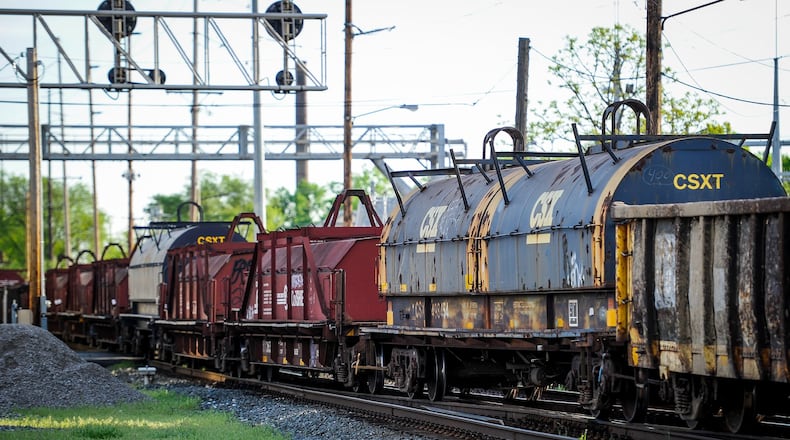A CSX line bisects the city of Trenton, and Fire Chief Darrell Yater said there are four intersections that could be blocked by a train. With freight trains potentially reaching 1 to 2 miles long, all four could be blocked at the same time, he said. Fortunately, that hasn’t happened, but the simultaneous blocking of three intersections has, he said.
“If a train stops and it’s at its full length, it could shut down all four crossings in the city which is going to make it difficult for the fire (engines) and the life squad to get to the other side of town,” Yater said, saying they will need to call mutual aid if they know a train is running through town.
Freight trains stop on the tracks for various reasons, but the reason trains stop for multiple hours is for a switch adjustment. This is a physical switch where a train employee must get off the train to engage a lever, or switch, to change the direction of the track. Trains can be up to 2 miles in length, or longer.
Companies have been fined for their trains unlawfully blocking railroad crossings, as state law says freight trains cannot obstruct an intersection for longer than five minutes. There have been dozens of fines levied by area courts, but fines average up to a couple of hundred dollars or less, according to court records. Some Butler County judges told the Journal-News court fines are a plea agreement between the municipal courts and the railroads.
Two southwest Ohio lawmakers, Reps. Thomas Hall, R-Madison Twp., and Jessica Miranda, D-Forest Park, want to fine railroads as much as $5,000 for a first offense, and as much as $10,000 for each subsequent offense.
CSX Transportation spokesperson Sheriee Bowman said the company has no comment on the proposed bill but added the company “is proud of our long-standing, cooperative and productive working relationship with public officials in Ohio.”
“We stand ready to work with public officials to review any CSX specific operational concerns in a way that allows efficient, sustainable, and essential freight rail transportation to continue serving Ohio industries while minimizing impacts to citizens,” she said.
Norfolk Southern spokesman Jeff DeGraff said it’s not the company’s policy to comment on proposed legislation, but he did say, “Norfolk Southern makes every effort to minimize the time that trains interrupt motor vehicle traffic at railroad crossings. We are committed to working with customers and communities across our network to enhance the safety and efficiency of rail operations.
Some Butler County communities, like Hamilton and Fairfield, cite and prosecute train companies when freight trains unlawfully block railroad crossings. More than $26,000 in fines have been paid by the railroad companies over the past decade, according to court records. But at least one Ohio community, the city of Defiance, was told by a federal judge in 2017 it can no longer prosecute because the Interstate Commerce Commission Termination Act of 1995 preempted Ohio law.
Hall said he understands the railroad companies will likely win in federal court if House Bill 361 passes, “but we have to do something. We want to make sure our constituents’ voices are heard.”
“This is a huge problem and we have to make sure our residents are being represented at the Statehouse just as much as they’re represented at the local level or the federal level,” Hall said.
House Transportation and Public Safety Committee Chairman Rep. Brian Baldridge, R-Winchester, said he expects House Bill 361 to be assigned to his committee later this month. The committee has had previous discussions on trains blocking crossings and said there are a number of factors that contribute to the problem, including urban sprawl.
“There are a number of subdivisions that weren’t there 20 years ago,” he said.
While residents in St. Clair Twp. want something like Hamilton’s South Hamilton Crossing, an overpass to a freight rail line south of the city’s downtown, Butler County Engineer Greg Wilkens said that is a costly option. But building a bridge may be the only option for communities looking to avoid the problem, as issuing citations and fining railroads may ultimately be moot depending on a looming Ohio Supreme Court decision.
The 3rd District Court of Appeals of Ohio overturned a lower court’s decision to dismiss five complaints alleging CSX violated Ohio’s blocked crossing statute. The state of Ohio filed suit and challenged the trial court’s determination the state statute is preempted by the ICCTA.
Appeals Court Judge Stephen Shaw, writing for the majority wrote that “if any Ohio court is going to adopt and incorporate the judicial determination of other jurisdictions as the law of Ohio that under the ICCTA, a railroad company has untrammeled discretion to block any rail crossing in any community in the state for any purpose ... then the court making that ruling should be the Supreme Court of Ohio.”
Judge John Willamowski sided with Shaw’s opinion.
Though William Zimmerman dissented, he did write though “the trial court’s dismissal was the correct legal solution,” he wrote he was “sympathetic to the majority’s attempt to push back at CSX’s obstructionist behavior at public crossings.”
The Ohio Supreme Court heard arguments on the case on April 28, but the justices have yet to render a decision. If the high court sides with CSX, then any law attempting to fine trains hauling interstate commerce would be unconstitutional, according to judges that spoke with the Journal-News.
About the Author

